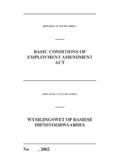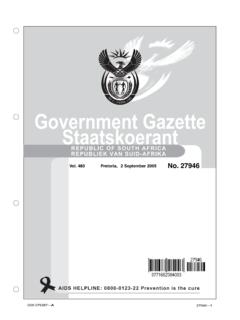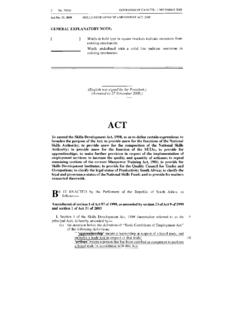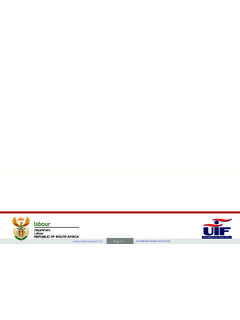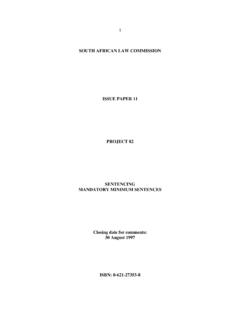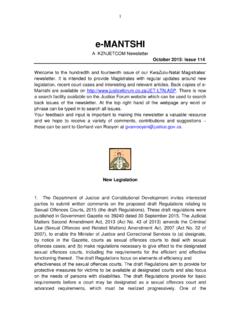Transcription of REPUBLIC OF SOUTH AFRICA - Department of Labour
1 REPUBLIC OF SOUTH AFRICABASIC CONDITIONS OFEMPLOYMENT ACTNo , 1997 ACTTo give effect to the right to fair Labour practices referred to in section 23(1) of theConstitution by establishing and making provision for the regulation of basicconditions of employment; and thereby to comply with the obligations of theRepublic as a member state of the International Labour Organisation; and toprovide for matters connected IT ENACTED by the Parliament of the REPUBLIC of SOUTH AFRICA asfollows: TABLE OF CONTENTSCHAPTER ONED efinitions, purpose and application of this Act1. Definitions2. Purpose of this Act3. Application of this Act4.
2 Inclusion of provisions in contracts of employment5. This Act not affected by agreementsCHAPTER TWOR egulation of working time6. Application of this Chapter7. Regulation of working time8. Interpretation of day9. Ordinary hours of work10. Overtime11. Compressed working week12. Averaging of hours of work13. Determination of hours of work by Minister14. Meal intervals15. Daily and weekly rest period16. Pay for work on Sundays17. Night work18. Public holidaysCHAPTER THREEL eave19. Application of this Chapter20. Annual leave21. Pay for annual leave22. Sick leave5101520253023. Proof of incapacity24. Application to occupational accidents or diseases25.
3 Maternity leave26. Protection of employees before and after birth of a child27. Family responsibility leaveCHAPTER FOURP articulars of employment and remuneration28. Application of this Chapter29. Written particulars of employment30. Informing employees of their rights31. Keeping of records32. Payment of remuneration33. Information about remuneration34. Deductions and other acts concerning remuneration35. Calculation of remuneration and wagesCHAPTER FIVET ermination of employment36. Application of this Chapter37. Notice of termination of employment38. Payment instead of notice39. Employees in accommodation provided by employers40.
4 Payments on termination41. Severance pay42. Certificate of serviceCHAPTER SIXP rohibition of employment of children and forced labour43. Prohibition of employment of children44. Employment of children of 15 years or older45. Medical examinations46. Prohibitions47. Evidence of age48. Prohibition of forced labourCHAPTER SEVENV ariation of basic conditions of employment49. Variation by agreement50. Variation by MinisterCHAPTER EIGHTS ectoral determinations51. Sectoral determination52. Investigation53. Conduct of investigation54. Preparation of report55. Making of sectoral determination56. Period of operation of sectoral determination57.
5 Legal effect of sectoral determination58. Employer to keep a copy of sectoral determinationCHAPTER NINEE mployment Conditions Commission59. Establishment and functions of Employment Conditions Commission60. Composition of Commission3510152025303540455061. Public hearings62. Report by CommissionCHAPTER TENM onitoring, enforcement and legal proceedings63. Appointment of Labour inspectors64. Functions of Labour inspectors65. Powers of entry66. Powers to question and inspect67. Co-operation with Labour inspectors68. Securing an undertaking69. Compliance order70. Limitations71. Objections to compliance order72. Appeals from order of Director-General73.
6 Order may be made order of Labour Court74. Consolidation of proceedings75. Payment of interest76. Proof of compliance77. Jurisdiction of Labour Court78. Rights of employees79. Protection of rights80. Procedure for disputes81. Burden of proofCHAPTER ELEVENG eneral82. Temporary employment services83. Deeming of persons as employees84. Duration of employment85. Delegation86. Regulations87. Codes of Good Practice88. Minister s power to add and change footnotes89. Representation of employees or employers90. Confidentiality91. Answers not to be used in criminal prosecutions92. Obstruction, undue influence and fraud93. Penalties94.
7 This Act binds the State95. Transitional arrangements and amendment and repeal of laws96. Short title and commencementSCHEDULESS chedule One: Procedures for progressive reduction of maximum working hoursSchedule Two: Maximum permissible fees that may be imposed for failure to complywith this ActSchedule Three: Transitional provisionsSchedule Four: Laws repealed by section 95(5)CHAPTER ONED efinitions, purpose and application of this this Act, unless the context indicates otherwise agreement includes a collective agreement; area includes any number of areas, whether or not contiguous;45101520253035404550 bargaining council means a bargaining council registered in terms of the LabourRelations Act, 1995, and, in relation to the public service, includes the bargainingcouncils referred to in section 35 of that Act; basic condition of employment means a provision of this Act or sectoraldetermination that stipulates a minimum term or condition of employment; CCMA means the commission for Conciliation, Mediation and Arbitrationestablished in terms of section 112 of the Labour Relations Act, 1995; child means a person who is under 18 years of age.
8 Code of good practice means a code of good practice issued by the Minister interms of section 87 of this Act; collective agreement means a written agreement concerning terms andconditions of employment or any other matter of mutual interest concluded by oneor more registered trade unions, on the one hand and, on the other hand (a)one or more employers;(b)one or more registered employers organisations; or(c)one or more employers and one or more registered employers organisation; commission means the Employment Conditions commission established bysection 59(1); compliance order means a compliance order issued by a Labour inspector interms of section 69(1); Constitution means the Constitution of the REPUBLIC of SOUTH AFRICA , 1996 (ActNo.)
9 108 of 1996); council includes a bargaining council and a statutory council; Department means the Department of Labour ; Director-General means the Director-General of Labour ; dispute includes an alleged dispute; domestic worker means an employee who performs domestic work in the homeof his or her employer and includes (a)a gardener;(b)a person employed by a household as driver of a motor vehicle; and(c)a person who takes care of children, the aged, the sick, the frail or the disabled,but does not include a farm worker; employee means (a)any person, excluding an independent contractor, who works for anotherperson or for the State and who receives, or is entitled to receive, anyremuneration; and(b)any other person who in any manner assists in carrying on or conducting thebusiness of an employer,and employed and employment have a corresponding meaning;1 employers organisation means any number of employers associated together forthe purpose, whether by itself or with other purposes, of regulating relationsbetween employers and employees or trade unions.
10 Employment law includes thisAct, any otherAct the administration of which hasbeen assigned to the Minister, and any of the following Acts:(a)The Unemployment Insurance Act, 1966 (Act No. 30 of 1966);(b)the Manpower Training Act, 1981 (Act No. 56 of 1981);(c)the Guidance and Placement Act, 1981 (Act No. 62 of 1981);(d)the Occupational Health and Safety Act, 1993 (Act No. 85 of 1993);(e)the Compensation for Occupational Injuries and Diseases Act, 1993 (Act of 1993); farm worker means an employee who is employed mainly in or in connectionwith farming activities, and includes an employee who wholly or mainly performsdomestic work in a home on a farm; LabourAppeal Court means the LabourAppeal Court established by section 167of the Labour Relations Act, 1995; Labour Court means the Labour Court established by section 151 of the LabourRelations Act, 1995;1.

